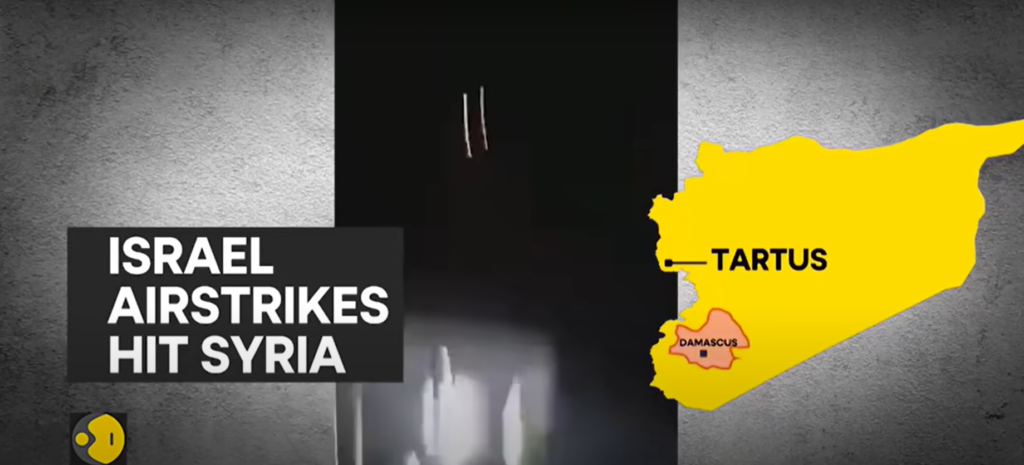On April 2, Israel attacked several targets of the Syrian army and the Iranian militias in the Homs region of Syria, the Syrian media reported that 5 military personnel were injured in the attack.
A Syrian opposition organization stated that one of the targets attacked was a military base where Hezbollah operatives are located.
It was Israel’s third attack in 4 days and the ninth attack since the beginning of the year.
Israel increased the attacks on Iranian and Hezbollah targets also as part of the Israeli response to the bomb attack at the Megiddo Junction which Iran and Hezbollah were behind it .
At the end of last week, Israel attacked with missiles bases of the Syrian army and the Iranian militias west of Damascus, according to sources in the Syrian opposition, five activists in Iran’s Revolutionary Guards were killed in the attack.
The Iranians officially announced in an unusual announcement that the Israeli attack killed General Milad Haidari, a military adviser to the Revolutionary Guards in Syria, in an unusual move a photo of him was also published in Iran’s media.
According to security sources in Israel, he was involved in directing terrorist attacks against Israel, according to Western intelligence sources, he was a senior officer in the cyber force of the Revolutionary Guards and was also involved in the precision missile project intended for Hezbollah.
Sources in the Israeli security system said that the attack was intended to damage a shipment of electronic components that arrived from Iran for Hezbollah’s precision missile project.
Iran submitted an official protest to the UN over the killing of military adviser Milad Haidari and warned from escalation.
The Iranian Foreign Ministry claimed that the Israeli attack in Syria is an Israeli attempt to divert attention from the internal crisis within Israel.
General Khomerat Haidari, the commander of the ground forces in the Iranian army, said on April 1 that there is complete readiness to act against any possible attack and emphasized that Iran will respond destructively to any attack in a fraction of a second.
In Israel’s security establishment, it is estimated that Iran will not sit quietly over the death of General Milad Haidari and is looking for ways to respond in a short time to his death.
One of the estimates is that Iran will try to use drones to attack one of the Israeli-owned ships engaged in the transfer of goods in the Arabian Sea.
The Iranians may also respond by attacking the American bases in Syria and Iraq, attacks on the American base in Tanef, in the border triangle of Syria, Jordan and Iraq or attacks on the American base in the gas field east of the Euphrates River in Syria.
Iran is waging a war of attrition against the American military presence in Syria in order to force the US to withdraw the soldiers stationed in Syria, a total of about 900 soldiers.
Israel is following with great concern the advanced weapons that Iran is smuggling to Syria for the Hezbollah organization and especially equipment intended for the precision missile project, in recent weeks Iran has increased the smuggling of shipments containing electronic components for this project.
Israel has accurate information about the arms shipments from Iran to Syria and makes sure to attack them as soon as they arrive in Syrian territory and before the Syrians transfer them to Lebanon.
Israel has a clear operational and intelligence advantage over Syria and uses it to act against the Iranian militias and Hezbollah in Syria, it refrains from attacking Hezbollah targets in Lebanon to prevent an escalation and deterioration of the security situation that could lead to a round of fighting against Hezbollah in Lebanon or an all-out war, especially in the month of Ramadan.
Tensions between Iran and Azerbaijan
In the meantime, the tensions between Iran and Azerbaijan are also increasing following what Israeli Foreign Minister Eli Cohen said at a joint press conference with Azerbaijan’s Foreign Minister Jihon Piramov about forming a united front against Iran.
Iran demands an official clarification from Azerbaijan about its cooperation with Israel, Nasser Kanani, the spokesman for the Iranian Foreign Ministry said that this is further proof of Israel’s evil intentions to turn Azerbaijan’s territory into a front that will threaten Iran’s national security.
He warned Azerbaijan not to fall into the trap set by Israel and threatened that Iran would not stand aside in the face of the Zionist enemy’s conspiracy.
Azerbaijan’s Foreign Ministry rejected Iran’s accusations and said that it is the rapprochement between Iran and Armenia that poses a threat to the region.
The tensions between Iran and Azerbaijan have been going on for several years, Iran accuses Azerbaijan of allowing the Israeli Mossad to establish a base in its territory and that Israel plans to attack targets in Iran from Azerbaijan’s territory.




